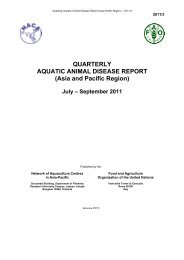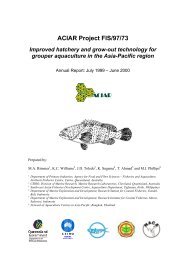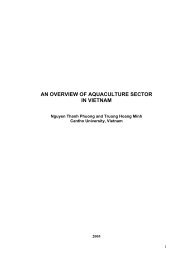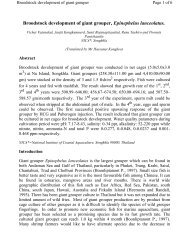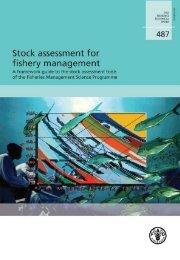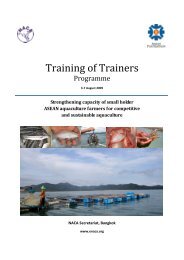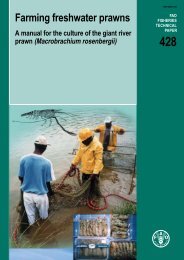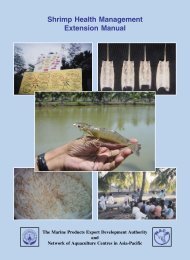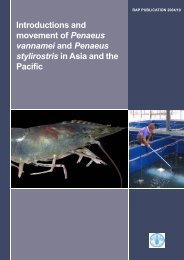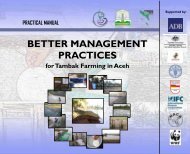One of <strong>the</strong> key elements for success in cooperative semi-intensive or intensive shrimp farming seems tobe access to credit. However, <strong>the</strong> danger with making credit available to people who have littleexperience in managing credit is that <strong>the</strong>y can easily fall into <strong>the</strong> trap of spending available moneyduring grace periods <strong>and</strong> thus failing to meet payment deadlines. Also, <strong>the</strong> risk, particularly of a firstcrop loss, can place <strong>the</strong> poor <strong>and</strong> small-scale shrimp farmer in a precarious debt situation from whichhe/she may find it difficult if not impossible to recover. Risk issues are discussed fur<strong>the</strong>r in Chapter 5.In addition to access to credit, training <strong>and</strong> extension expertise are important factors for <strong>the</strong> poor smallscalefarmers. Extension work can be set up in <strong>the</strong> community, with experts looking after a moderatelylarge number of small-scale operations <strong>and</strong> helping <strong>the</strong> farmers adjust <strong>the</strong>ir operations to variousconditions.Mitigation of lack of credit accessThe lack of credit availability to <strong>the</strong> poorer sectors of society in developing countries is a majorconstraint to <strong>the</strong>ir becoming shrimp farmers (Holl<strong>and</strong> 1998). However, easy credit may encourage bothunsustainable practices <strong>and</strong> indebtedness, so credit should not be extended lightly. There are examplesfrom Thail<strong>and</strong> of easy credit availability to promote small-scale shrimp aquaculture in <strong>the</strong> early ’90sthat resulted in extremely rapid intensification, <strong>and</strong> in some cases environmental degradation, disease,financial collapse, <strong>and</strong> indebtedness.As with o<strong>the</strong>r incentives, credit should not be used in isolation but ra<strong>the</strong>r as one element in a suite ofincentives <strong>and</strong> constraints designed to ensure <strong>the</strong> sustainability of <strong>the</strong> sector in a particular area orregion. Conditionalities related to credit (in terms of farm operation or intensity) will be hard toenforce, <strong>and</strong> it will generally be more appropriate to strictly limit <strong>the</strong> amount available, <strong>and</strong> relate it to<strong>the</strong> scale of enterprise <strong>and</strong> skill of <strong>the</strong> farmer. Such practices should help ensure that intensification isnot overly rapid, <strong>and</strong> that skills can develop steadily as <strong>the</strong> use of inputs <strong>and</strong> production levels increase.Very small amounts of credit, coupled with effective extension-based support <strong>and</strong> infrastructure, canlead to highly significant increases in income for shrimp growers as well as <strong>the</strong>ir employees.Displacement of local populationsDisplacement of local populations as a result of some of <strong>the</strong> impacts described above has beenreported, but <strong>the</strong>re are few well-documented <strong>and</strong> thoroughly researched examples. In many cases, it isunclear whe<strong>the</strong>r shrimp farming was <strong>the</strong> major factor, a contributory factor, or merely incidental tocommunities’ displacement. However, <strong>the</strong>se are serious issues <strong>and</strong> deserve fur<strong>the</strong>r research.Human rights violationsThere have been reports of human rights violations in connection with <strong>the</strong> development of shrimpfarms. Such cases are usually associated with large corporations that invest in a local area <strong>and</strong> resort tophysical force to intimidate protesters. In <strong>the</strong> course of this study, no conclusive evidence of humanrights violations was found. Secondary information is commonly reported <strong>and</strong> presented as “evidence,”without any attempt to obtain a firsth<strong>and</strong>, objective description of <strong>the</strong> situation. Once again, <strong>the</strong>seissues are serious <strong>and</strong> warrant objective study.Social disturbancesDisruption to local livelihoods <strong>and</strong> communities has sometimes been sufficient to provoke socialdisquiet, <strong>and</strong> in some cases serious social disturbances, e.g., in Bangladesh, India (Murthy 1997), <strong>and</strong>o<strong>the</strong>r countries. The 1994 NACA survey reported wide variations in Asia, with ra<strong>the</strong>r few (
with o<strong>the</strong>r economic activities to <strong>the</strong> extent that social unrest erupted in <strong>the</strong> region in 1996 (Khor1997).It is clear that <strong>the</strong>re have been social conflicts, <strong>and</strong> in some cases more widespread social disturbances,associated with shrimp farming, but <strong>the</strong>re is very little well-documented information about <strong>the</strong>se issues,<strong>the</strong> real nature of <strong>the</strong> conflicts, <strong>and</strong> <strong>the</strong> role that shrimp farming has played in <strong>the</strong>m.CorruptionIn many developing countries with areas suitable for shrimp farming, corruption among <strong>the</strong> central<strong>and</strong>/or local authorities has become a problem. Corruption occurs in several ways. First, officials incharge of giving permits may be “bought” (persuaded by bribes) to ignore rules <strong>and</strong> regulations, or tomisinterpret <strong>the</strong>se rules in favor of a certain party. In o<strong>the</strong>r cases, law enforcers may be paid to ignorenonadherence to environmental requirements. It has also been claimed that illicit funds, for examplefrom narcotics trading, have been laundered by being channeled into shrimp farming. One reason for<strong>the</strong> prevalence of <strong>the</strong>se practices may be that officials with responsibility for <strong>the</strong> distribution of shrimpfarming permits <strong>and</strong> o<strong>the</strong>r rights are often underpaid, in some cases grossly so.Though corruption has been noted in shrimp farming, such problems are by no means unique to <strong>the</strong>shrimp farming industry. Ra<strong>the</strong>r than ignoring <strong>the</strong> possibility of corruption, it should be taken intoaccount when designing <strong>the</strong> regulatory system that is to govern shrimp farming. Rules must be made sosimple <strong>and</strong> clear that <strong>the</strong>y leave little or no room for individual interpretation or discretion by <strong>the</strong>official.Public income <strong>and</strong> public spendingThe foreign currency earnings from shrimp aquaculture make it extremely attractive to nationalauthorities in developing countries. Several major shrimp farming countries have significantlyincreased <strong>the</strong>ir export earnings as a result of shrimp farm development. Cases in point are Ecuador,Indonesia, Thail<strong>and</strong>, China, <strong>and</strong> Vietnam.Local <strong>and</strong> national incomes derived from shrimp farming operations may also be considerable.Taxation of such enterprises <strong>and</strong> <strong>the</strong>ir employees is usually a relatively straightforward matter.However, in many developing countries, governments have given companies a tax moratorium for <strong>the</strong>first few years (for example, up to 10 years in Thail<strong>and</strong>) in order to make <strong>the</strong> investment attractive. Insome cases, this has meant that by <strong>the</strong> time <strong>the</strong> operation was liable for <strong>the</strong> usual taxes, it may alreadyhave been discontinued due to disease <strong>and</strong> reduced profitability. In <strong>the</strong>se cases, public income fromshrimp farming may be negative, if significant public works have been undertaken to support <strong>the</strong>activity.Public works expenditures may include a number of infrastructure investments such as roads, waterfacilities, <strong>and</strong> electricity distribution. Sometimes, such expenditures are necessary to induce investors,<strong>and</strong> <strong>the</strong> public outlay may be considerable. Although o<strong>the</strong>r economic sectors may also benefit fromsuch expenditures, <strong>the</strong> price may in some cases be too high from a national budget allocationperspective.ConclusionsThe social <strong>and</strong> economic impacts of shrimp farming have been extremely variable throughout <strong>the</strong>world, reflecting enormous social, economic, <strong>and</strong> political differences, as well as <strong>the</strong> wide range ofshrimp culture technologies <strong>and</strong> <strong>the</strong> variety of habitats or l<strong>and</strong> types on which it has been developed.Very few studies that objectively balance <strong>the</strong> costs <strong>and</strong> benefits at a district, regional, or indeednational level have been conducted. A program of such studies covering a range of development <strong>and</strong>natural resource contexts is urgently needed.However, it is clear that shrimp farming has had significant negative social impacts in some areas, <strong>and</strong>equally clear that it has brought social <strong>and</strong> economic benefits to o<strong>the</strong>rs. If shrimp culture is to be asignificant force in development <strong>and</strong> poverty alleviation in coastal areas, <strong>the</strong>se benefits must becontinued over time <strong>and</strong> distributed more equitably.46
- Page 7 and 8: sensitivity analysis should include
- Page 9 and 10: ABBREVIATIONSMTkgmcmhaozPUDFOBCIFC&
- Page 11 and 12: ORGANIZATION OF THE REPORTIn Chapte
- Page 13 and 14: same time, development is necessary
- Page 15 and 16: Current shrimp farming practice inc
- Page 17 and 18: Current status of the industryToday
- Page 19 and 20: In recent years, several major crop
- Page 21: CHAPTER 2: SHRIMP FARMING SYSTEMSSh
- Page 24 and 25: FeedsHatcheries use a combination o
- Page 26 and 27: FIGURE 8. CONTINUUM OF DIFFERENT SH
- Page 28 and 29: TABLE 3. COMPARISON OF INPUTS FOR T
- Page 30 and 31: Shrimp farming systems vary greatly
- Page 32 and 33: creeks, and sea-grass beds, fulfill
- Page 34 and 35: arrangement in Thailand, for exampl
- Page 36 and 37: capacity is not exceeded, the nutri
- Page 38 and 39: shrimp or high-value finfish produc
- Page 40 and 41: In more immediately practical terms
- Page 42 and 43: Disease prevention and managementDi
- Page 44 and 45: (Raa 1996) indicates that it is pos
- Page 46 and 47: suitable for human consumption or f
- Page 48 and 49: • Supply and effluent canals shou
- Page 50 and 51: CHAPTER 4: SOCIAL AND ECONOMIC IMPA
- Page 52 and 53: opportunities would need to be iden
- Page 54 and 55: 26 workdays per hectare, and an ext
- Page 58 and 59: Minimizing negative social repercus
- Page 60 and 61: CHAPTER 5: FINANCIAL RISKS ASSOCIAT
- Page 62 and 63: Credit riskAccess to credit at fair
- Page 64 and 65: Natural factorsShrimp diseaseThe ou
- Page 66 and 67: CHAPTER 6: PLANNING AND MANAGEMENT
- Page 68 and 69: Planning and resource managementIna
- Page 70 and 71: Such initiatives have been or are b
- Page 72 and 73: Conclusions and recommendationsReco
- Page 74 and 75: equired to promote sustainability a
- Page 76 and 77: CHAPTER 7: PROJECT PLANNING AND ASS
- Page 78 and 79: • Appraisal and supervision missi
- Page 80 and 81: The structure of the executive summ
- Page 82 and 83: CHAPTER 8: CONCLUSIONS, RECOMMENDAT
- Page 84 and 85: • Requirements and guidance for f
- Page 86 and 87: EmploymentAs mentioned in the repor
- Page 88 and 89: ANNEX 1: A BLUEPRINT FOR FEASIBILIT
- Page 90 and 91: • Sensitivity calculations and an
- Page 92 and 93: Table A4: World shrimp farming prod
- Page 94 and 95: ANNEX 4: CASE STUDIES UNDERTAKEN BY
- Page 96 and 97: ColombiaThe Adoption of Good Manage
- Page 98 and 99: LocationAppendix A--Meetings Held o
- Page 100 and 101: LocationAppendix A--Meetings Held o
- Page 102 and 103: LocationAppendix A--Meetings Held o
- Page 104 and 105: BIBLIOGRAPHYAdger, W.N. 1998. Susta
- Page 106 and 107:
Claridge, G. 1996. Legal approaches
- Page 108 and 109:
Hambrey, J.B., M. Phillips, K. Chow
- Page 110 and 111:
Phillips, M.J., & D.J. Macintosh. 1
- Page 112:
World Commission on Environment and



